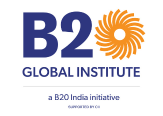Issue Brief
Thematic Area: Digital Transformation, Advanced Technologies, and Cyber Security

Recent G20 Initiatives on Digital Economy
Introduction
Global commercial flows have changed dramatically over the past few decades due to the rapid uptake and utilization of digital technology to facilitate financial and monetary flows. Online shopping, crypto currency, and social media have become livelihoods and principal points of sale (PoS) for commercial entities across a plethora of sectors. As a result, the digital economy has emerged as a significant growth area with a projected growth rate of approximately 7 percent through 2028. To promote the equitable uptake of digital financial infrastructure, G20 nations have taken significant initiatives in recent years to promote accessibility across G20 member nations to allow more G20 citizens to participate in the global digital economy.
G20 and B20 India
Digital Public Infrastructure (DPI) was a core component of G20 and B20 Secretariats during India’s G20 Presidency. In the G20 Policy Recommendations for advancing Financial Inclusion and Productivity Gains through DPI published during India’s G20 Presidency, the G20 put forth five key policy recommendations to advance the adoption and accessibility of DPI. The first of these recommendations centered around the utilization of DPI to accelerate production and financial inclusion through incorporating DPI within national strategies, implementing DPI in public programs, and encouraging public-private partnerships for greater uptake of DPI. The G20 urges global digital economy stakeholders to create risk-based regulations and common best practices. It also supports robust governance frameworks and consumer protection.
Moreover, the digital economy was promoted in the Policy Paper published by the B20 India Task Force on Financial Inclusion for Economic Empowerment. In the report, the Task Force advocates for G20 nations to support the development of secure, affordable, and accessible digital financial products. Moreover, the Task Force advocates for the rollout of DPI through the promotion of digitization of identities at the farm, enterprise, and individual level and safeguards for the seamless delivery of public services. The Task Force recommends creating a robust consumer protection framework to enhance cybersecurity, data privacy, and trust for secure digital financial services.
The B20 India Task Force on Digital Transformation also recommended that the G20 nations support the digital economy through the promotion of enterprise transformation of Medium, Small, and Micro Enterprises (MSMEs) through access to a globally recognized, sector specific toolkit. Specifically, the Task Force advocates for the development of a digital ecosystem with end-to-end support of MSMEs as they undergo their digital transformation journey. Moreover, to this end, the B20 Task Force believes that the development of this ecosystem would, in turn, build a user-friendly and accessible platform that caters to the needs of MSMEs of different sizes and industries.
Additionally, the Task Force on B20 India Digital Transformation advocates for the G20 nations to complement and amplify private sector efforts along the entire value chain to boost internet accessibility and device affordability through innovative and inclusive financing schemes for networks, services, and devices. In turn, this would increase the number of digital users, which would greatly support accessibility and scale of the global digital economy.
B20 Brazil
The B20 Brazil Task Force on Finance and Infrastructure expanded upon the B20 India’s initiative to digitally integrate MSMEs into global value chains. In their Policy Paper, the Task Force advocates for G20 nations to streamline administrative processes for global integration through increasing cross border interoperability. The Task Force argues that digitalization would lower barriers of entry for MSMEs to enter global value chains. The Task Force states that digital technologies streamline commercial documentation, environmental compliance procedures, swift information exchange, license automation, and lower bureaucracy and cost for companies. In turn, the promotion of grater digitalization of the economy would strengthen cross-border operability and increase the efficiency of the economy.
Likewise, the B20 Brazil Task Force on Trade and Investment advocates for the digitalization of customs clearance and international cooperation for cross border flows, which, in turn, would improve the ease of doing business while also scaling the digital economy. Additionally, the Task Force advocates for greater deregulation related to the infrastructure and connectivity of digital economies amongst G20 nations and beyond as well as the creation of a fund to support digitalization initiatives.
G20 South Africa
Digital Economy is one of the priority areas under the G20 South Africa Sherpa Track with four key focus areas. First, the G20 South Africa intends to improve connectivity for inclusive digital development through educating participants from G20 nations on statistics and sustainable financing models, publish a paper on regulatory strategies as the foundational requirement for effective participation of citizens, and implementing a framework to connect the unconnected.
Second, the G20 South Africa intends to build upon previous DPI initiatives by the G20 India and Brazil Presidencies to strengthen DPI infrastructure amongst G20 members. To improve DPI implementation amongst G20 members, the G20 South Africa intends to host a virtual workshop on effective DPI implementation, develop instruments to further support the permeance of DPI across G20 member nations.
Third, the G20 South Africa would build upon previous initiatives to build upon previous digitalization initiatives to support MSMEs. Specifically, the G20 South Africa would organize a showcase for MSMEs to highlight economic development, local solutions, and higher-value employment in the digital economy. In addition, to support this focus area, the G20 South Africa would hold a workshop on digital innovation ecosystems, a future oriented paper on MSMEs, and a workshop of digitalizing MSMEs.
Finally, the G20 South Africa would promote the equitable, inclusive, and fair utilization of Artificial Intelligence (AI), as the technology is rapidly redefining global digital economic systems. To promote the adoption of AI, the G20 South Africa intends to host a workshop and develop a toolkit as well as guidelines related to inequalities and misinformation that arise from the technology.
